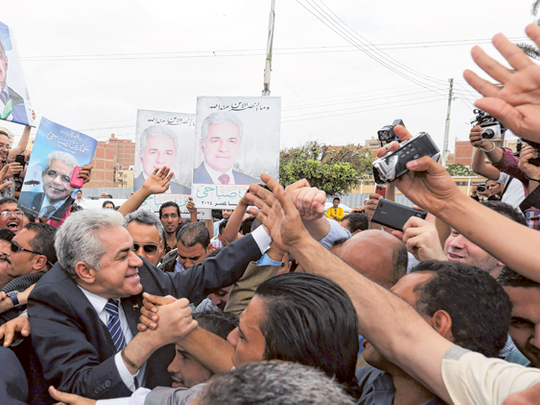
Cairo: More than four decades after his death, Egyptian nationalist leader Jamal Abdul Nasser is immensely popular in the country as the ‘man of the poor’ due to his socialist policies.
Nasser, an ex-military officer, is fondly remembered as Egypt is bracing for presidential elections contested by only two contenders. Supporters of both ex-army chief Abdul Fattah Al Sissi and his leftist challenger Hamdeen Sabahi portray their favoured candidates as the new Nasser.
Since he deposed Islamist president Mohammad Mursi of the Muslim Brotherhood last July, Al Sissi has generated cultlike adulation unknown in Egypt since Nasser’s era. The ex-general is likened to Nasser with their portraits often raised together at pro-Al Sissi rallies.
“I am very happy to be compared to Jamal Abdul Nasser,” Al Sissi, 59, said in a TV interview this week. “I hope I’ll be like him.”
Al Sissi’s backers believe he is able to end the turmoil that has convulsed the country since a 2011 uprising forced long-time president Hosni Mubarak out of power.
A military-backed crackdown on the Brotherhood is reminiscent of a tough clampdown ordered by Nasser on the Islamist group following a 1954 attempt on his life.
Like Nasser, Al Sissi is also seen as able to pursue a foreign policy free from influence of the US, which offers Egypt $1.3 billion (Dh4.77 billion) in annual military aid for its relationship with the Israelis.
In February, Al Sissi, a defence minister at the time, made a high-profile visit to Russia, raising much speculation in Egypt about a revival of strategic links with Moscow, which in the Soviet days used to be a staunch ally of Nasser.
“I was lucky to live in the days of Abdul Nasser who made the name of Egypt on the lips everywhere,” said Mahmoud Sharaf, a pensioner, who worked for years at a steel mill built by Nasser in southern Cairo.
“Whenever I see Al Sissi I remember Nasser. Al Sissi is proud of his homeland and dignity and is ready to sacrifice his life in defending them. This man is what Egypt needs now to restore the glories of Abdul Nasser.”
If he wins the May 26-27 elections, Al Sissi will be Egypt’s latest ruler to be drawn from the military.
Sabahi, meanwhile, espouses social justice-orientated policies and an influential regional role for Egypt, reminiscent of Nasser’s legacy.
Earlier this week, Sabahi, 59, kicked off his campaign in Assuit, Nasser’s hometown.
“I am proud of being here in the hometown of the leader Abdul Nasser, who was the defender of the poor,” said Sabahi, who came third in the 2012 presidential elections.
Paradoxically, Nasser’s family has announced support for Al Sissi’s presidential bid, calling him “the man of the phase”. Several leftist political parties have followed suit.
“The steps taken by Abdul Nasser in favour of farmers, workers and the Middle class were necessary to establish societal democracy,” said Ahmad Yousuf, a political-science professor at Cairo University. “It’s true that this democracy was not fulfilled under Nasser, but this will happen one day. Abdul Nasser is also remembered for liberating Egypt and the Arab world from colonialism.”
Nasser, who died in 1970 at the age of 52, carried out massive agrarian and labour reforms and initiated a modernisation drive disrupted by Egypt’s 1967 military defeat at the hands of the Israeli regime. He also championed Arab unity during his 16-year rule.
In 1956, he nationalised the Suez Canal, a major waterway, triggering what came to be known as the “Suez Crisis” that culminated in military attacks by Britain, France and the Israelis against Egypt.












